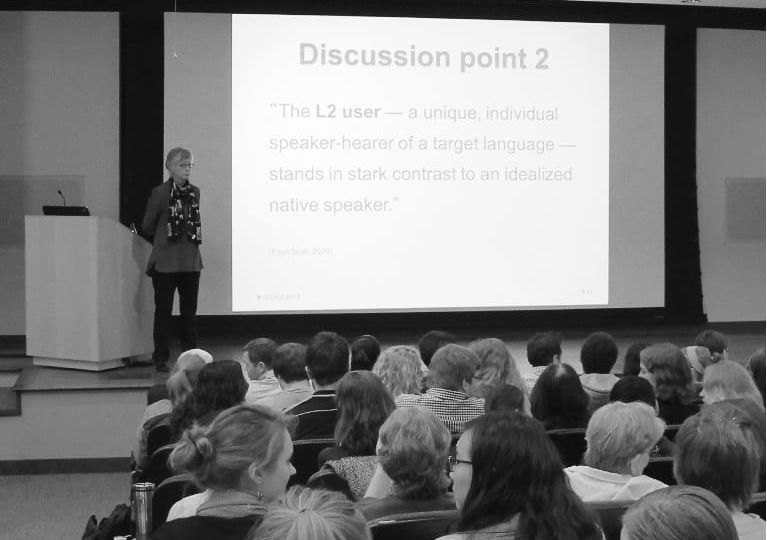
Language, identity and global citizenship were all on the table when prestigious speaker Virginia Scott spoke in Viking Theater on Thursday, April 24. Scott, chair of the Department of French and Italian at Vanderbilt University and a professor of French and applied linguistics, lectured about the importance of the second language, the impact it has on the sense of self and the attitudes that lead to a positive or negative language experience.
The event was sponsored by the linguistics department and all of the language departments, resulting in a packed auditorium.
“I don’t know if Vanderbilt would have gotten this turnout,” Scott said.
The event counted as a cultural event credit for many St. Olaf departments, so students could receive credit for learning about the importance of the language they study. The event was also open to the public, which brought a number of Northfield community members as well.
Scott opened the presentation with a few words spoken in Danish. She lived in France, Madagascar, Kenya and Denmark as a child, and so she picked up the ability to speak English, French, Danish, German and some Spanish and Italian. However, she would hesitate to call herself “fluent” or “bilingual.” She argued that these words are subjective and arbitrary.
“I want everyone to rethink bilingualism,” she said. “Language learning is a lifelong pursuit.” Not only is language learning a continual spectrum of progress, but Scott also maintained that learning is more than verb conjugation and vocabulary. It is about language awareness and the power that comes from communication.
“One of the things that struck me when I was learning a language was that sense of excitement that comes with communication with different language groups,” she said. “Where is that exciting sense in the classroom?”
Scott wants to remove the sense of disempowerment that keeps students from connecting with the passion of learning languages. It is vital, she noted, that students learn to feel comfortable in the sometimes awkward zone of learning.
“Language education places critical reflection about oneself, one’s own language,” she said. She added that the ability to converse with people of different cultures is an essential part of becoming a global citizen. In order to accomplish this goal, Scott proposed that students strive for their ideal second language L2 selves. Each person’s L2 experience is unique and individual and can be affected by numerous factors.
“Every single person has a unique language background residual in the sense of self that colors who you are as a language user,” Scott said.
Being future-oriented helps L2 users, as they can see the potential incentives that future language use will bring and are more motivated to work to achieve that state. The ideal L2 self thinks critically about the nature of language and has realistic expectations.
Scott’s talk sought to inspire Oles to realize the importance of language learning and of having a motivated attitude and looking into the future.
“The L2 feels empowered in being aware of the role of language in your life and in society and being able to envision,” Scott said. “That is key to global citizenship, without ever having to leave campus.”
The presentation may have been particularly appropriate for students with what Scott called rich language backgrounds – experience with other languages and understanding of the importance of language and how crucially it can be linked to identity.
Scott’s book “Double Talk” offers further insight into her ideas. Students interested in language-centered events can also contact the Linguistics Department or any one of St. Olaf’s language programs.
carcater@stolaf.edu
Photo Credit: BEKAH ENGSTRAND/MANITOU MESSENGER

